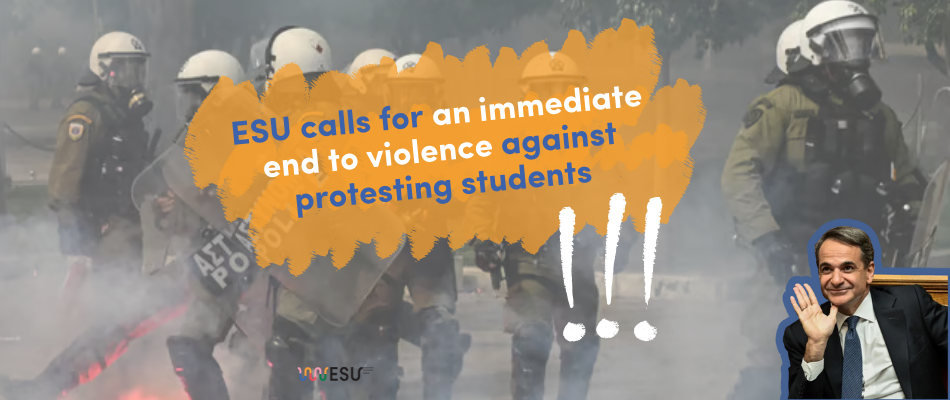
ESU Statement regarding student protests in Greece on the reform of higher education
On Saturday, March 8th, the Greek Parliament approved the government’s education reform legislative proposal, effectively ending state monopoly on delivering higher education and allowing private higher education institutions to operate within the country.
The education reform bill, which received 159 votes in favour from 299 lawmakers, goes against Article 16 of the Greek Constitution, which prohibits the operation of higher education institutions established by private persons for higher education. As such, according to the Greek constitution only self-governed public law legal entities can provide higher education. The decision was taken against the student voice, especially given that Greece has no national student representation. Within the Greek academic community many professors also have taken a public stance against the bill.
The new bill allows foreign universities to establish branches in the country, and private universities would be allowed to operate as Greek branches of foreign higher education institutions. Following this reform, eight professors of constitutional law have declared the government’s planned regulations for private higher education institutions unconstitutional, stating in a joint statement that a constitutional revision is required. This reform is part of the broader reform agenda aimed at aligning Greece with the European Union acquis, and, in this case, the freedom of movement of services. However, on the other side only around 3-4% of the public budget is allocated to education, which falls below the EU average.
Greek students have been protesting for two months following the announcement of the reform, arguing that it will devalue public higher education institutions and lead to reduced funding for public education. The protesters across the country were repeatedly confronted with violence by law enforcement units over the past weeks. On March 8th, in central Athens, the protests escalated into unparalleled violence with the use of petrol bombs and tear gas by the riot police. The moment witnessed a brutal and vicious police attack against students and demonstrators who were part of a large mobilisation against the reform bill. Tear gas, flash bangs, and excessive police violence resulted in the serious injury of at least eight protesters. Additionally, the police have been aggressively targeting protesters during the massive march in Syntagma Square, Thessaloniki, and on Stadiou Street near the Bank of Greece, where participants included students, teachers, and university employees. The demonstrations of over 8000 students are coordinated nationally by student councils and unions, which have garnered the support of educators, political leaders, and labour unions. Students who protest in Greece are concerned that the value of obtaining a higher education degree from Greece’s public higher education institutions will be diminished, through lesser investment in quality education, which could pave the way for further reforms that indirectly restrict accessibility to free higher education. It is noteworthy, that the bill and the connected violence against student protesters follows after in 2022 the Greek government stationed riot police on campus to intimidate students, causing uproar as due to the violent history of law enforcement on Greek campuses.
The European Students’ Union strongly condemns the use of violence by law enforcement units, which infringes upon the democratic right of students to protest in Greece. Furthermore, ESU condemns any form of infringement against campus security and the safety of students on campuses. ESU also emphasises the need for broad stakeholder involvement, including that of students, in all higher education decision making processes, especially when it comes to fundamental reforms, in line with Bologna Process commitments. Any reform, including the one at hand, has to respect constitutional and democratic rules regarding revision of the constitution. Additionally, ESU highlights the need for Greek public authorities to ensure the accessibility of higher education, including possibilities for free education and combating inequity in higher education.
Based on above, the European Students’ Union:
- Calls upon Greek authorities to end the violence against protesters, including student protesters,
- Reminds the Greek authorities about the historic events during the 1973 student uprising leading to multiple students killed and demands to uphold measures put in place to ensure campus integrity and safety of students,
- Demands that the reform process will be revised in line with democratic rules and under the broad and meaningful inclusion of the entire higher education community into the decision-making process, including students,
- Demands that public authorities ensure accessibility and equity in higher education, including the possibility to enjoy free quality education,
- Demands that public authorities ensure that public higher education receives full core funding and that, in case of the establishment of private higher education, this has no negative impact on public higher education institutions.
